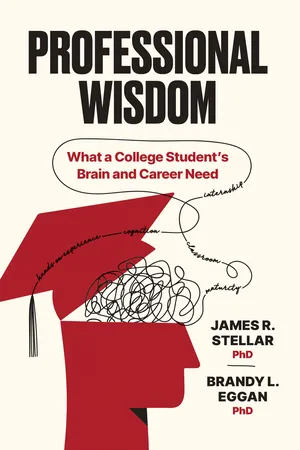
Professional Wisdom
What a College Student’s Brain and Career Need
- English
- ePUB (mobile friendly)
- Available on iOS & Android
Professional Wisdom
What a College Student’s Brain and Career Need
About this book
Higher education has a long history of transferring knowledge—facts and theories—into students’ minds. However, it has less of a history of providing students with direct experiences, such as internships, that lead to felt knowledge of the field and relevant skills. It is this combination of academic and felt knowledge that fosters the growth students need, which we refer to as “professional wisdom.”
This growth state is supported by basic neuroscience. Humans possess a crowning achievement of evolution in the neocortex, allowing us to perform amazing feats of cognitive symbolic logic, such as language and planning. Beneath the neocortex lies an older part of the brain that regulates emotional computation—the limbic system. This system provides a perspective of value, helping us determine whether a plan or activity is beneficial. Interestingly, neuroscience shows that the limbic system reacts most strongly to actual experiences, and it requires reflection to process these experiences into the higher cognitive regions of the brain.
When applied to higher education, this insight suggests that combining academic study with hands-on experiences—such as cooperative learning and internships—can lead to a lifelong career where students remain passionate and engaged. A major paired with an enjoyable, real-world experience in college helps students connect knowledge with purpose, fostering long-term satisfaction and success.
While some individuals, especially in academic administration, refer to this as “educating the whole student,” we describe it as cognitive-emotional integration, the foundation of professional wisdom. In this book, we explore the current experiences in higher education that foster this development, from cooperative learning to internships and beyond. We also offer two neuroscientists’ perspectives on how cognitive-emotional integration aligns with the brain’s natural processes.
With this understanding, we believe colleges and universities have an obligation to their students: to cultivate environments that challenge them both inside and outside the classroom. Without this, we risk graduating learners unprepared for the demands of the modern workforce.
Frequently asked questions
- Essential is ideal for learners and professionals who enjoy exploring a wide range of subjects. Access the Essential Library with 800,000+ trusted titles and best-sellers across business, personal growth, and the humanities. Includes unlimited reading time and Standard Read Aloud voice.
- Complete: Perfect for advanced learners and researchers needing full, unrestricted access. Unlock 1.4M+ books across hundreds of subjects, including academic and specialized titles. The Complete Plan also includes advanced features like Premium Read Aloud and Research Assistant.
Please note we cannot support devices running on iOS 13 and Android 7 or earlier. Learn more about using the app.
Information
Table of contents
- Cover
- Advance Praise
- Title Page
- Copyright Page
- Contents
- Two Coauthors
- Acknowledgments
- Preface Professional Wisdom in College Students
- Chapter 1 Cultivating Wisdom Through Experiential Learning in College
- Chapter 2 Two Minds in the Brain
- Chapter 3 How the Brain Works to Divide Implicit and Explicit Thinking
- Chapter 4 A Deeper Look at Implicit Brain Processes and Neuroplasticity
- Chapter 5 Crossing the Implicit-Explicit Threshold While Moving from Learning to Habit
- Chapter 6 Higher Education Structure and the Development of Professional Wisdom
- Chapter 7 Intelligence and How Best to Learn Inside and Outside of the Classroom
- Chapter 8 Impacts of COVID-19 and Remote Learning on Professional Wisdom
- Chapter 9 The Future of Higher Education in Combining Skills with Knowledge: Technology, AI, and Government
- Chapter 10 Back to the Brain: Neocortical Re-Representation, Explicit Thinking, and Neocortical Symbolic Logic
- Chapter 11 What Colleges and Universities Can Do to Develop Professional Wisdom
- Three Final Remarks from the Authors
- Conclusion
- Endnotes
- Index